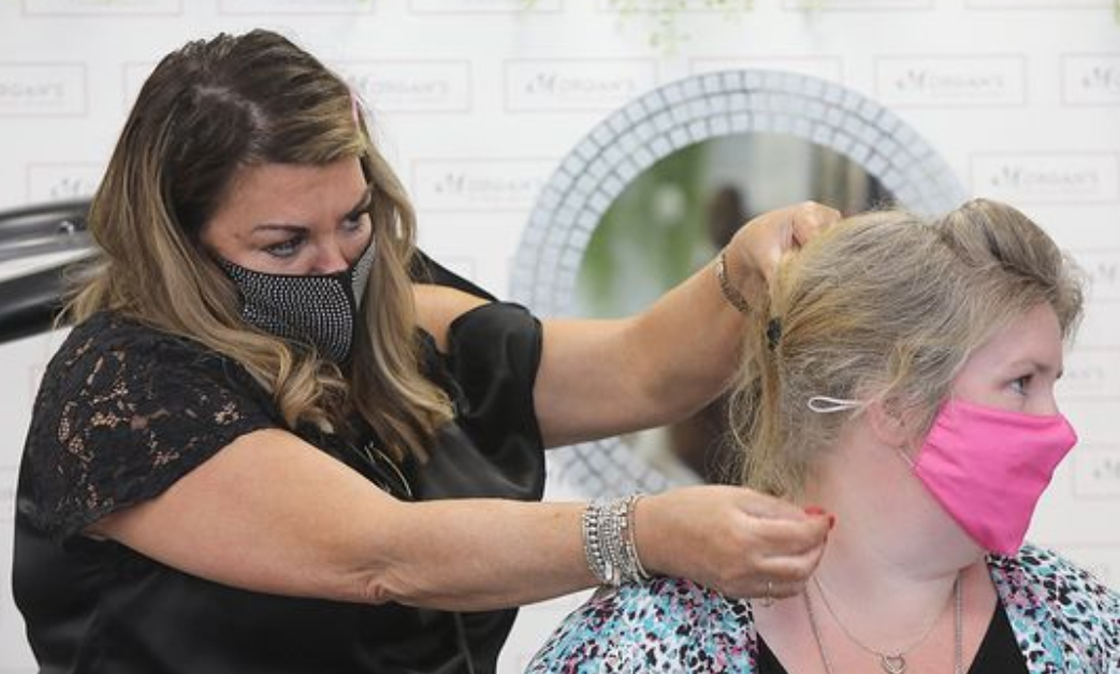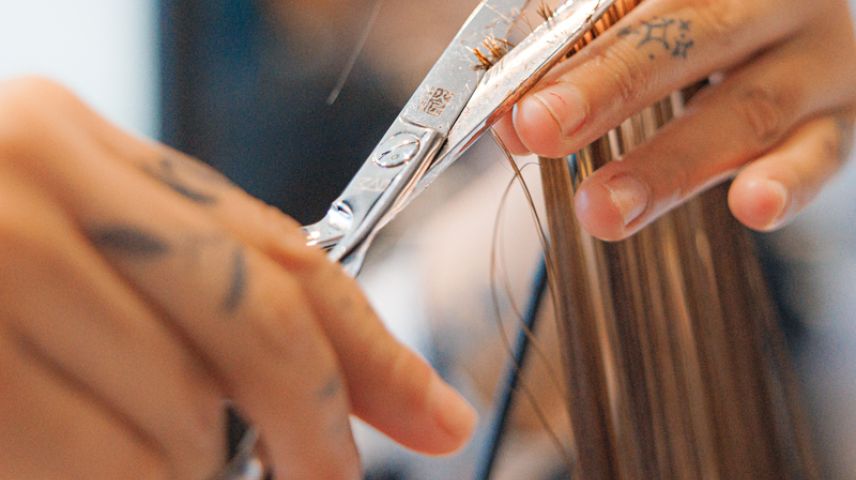Covid Linked Hair Loss – But There is a Solution with Morgan’s!
By
Morgan's Hair, Beauty & Wig Specialist

Since the start of the pandemic, over 4.5million people have tested positive for Covid-19, with many suffering long term effects. Hair loss is one symptom that can turn a woman’s life upside down, causing her more stress and anxiety with the prospect of losing her hair.
In this article, we asked Rebecca Morgan of Morgan’s Hair, Beauty & Wig Specialist in Prestatyn why Covid causes hair loss, the effects it is having on physical and mental health, and what can be done about it.
Why is my hair falling out because of Covid?
Research has suggested that when the body goes through a stressful phase of illness – fighting off Covid for example – it can send the hair follicles into the dormant phase. The type of hair shredding that is linked with the virus is called telogen effluvium (TE), which occurs after a period of either physical or mental strain.
To understand the reasoning behind hair falling out, it is useful to know about the three main stages of the hair cycle:
- Anagen: This is the growth phase where the nourishment of the hair follicles via blood supply facilitates the hair growth.
- Catagen: The middle stage, where the hair follicles detach from that nourishing blood supply.
- Telogen: Also known as the resting phase where the hair dies and falls out, then starts again.
With the major stressor (being Covid), the cycle can be rushed and skip to the telogen phase where the hair dies and falls out. Covid has been linked to a lack of oxygenation, fever, and general body stress, which pushes the hair follicles into ‘shut down’.
To grow hair, the body needs a lot of energy, so by the body shifting to the telogen phase, it can preserve energy that is still needed to recover from the Covid-19 infection.
A study published by The Lancet discovered that 22% would see hair loss as a long term symptom six months after being hospitalised with the virus.
The hairs that enter the telogen effluvium phase when you are sick with Covid-19 stay in that phase for approximately two to four months. The hair loss typically occurs at the top of the scalp. Due to the many ways Covid-19 affects the body and the overall stress the illness places on the immune system, it is not a coincidence many survivors are now experiencing hair loss. – Rebecca Morgan
Effects of losing hair on my mental and physical health
Over the past 18 months, life has not been easy. Mental health has particularly taken a strain on everyone, with anxiety levels rising.
The appearance of how you look is important to many women, and so the possibility of losing hair in the months after testing positive for Covid is a daunting matter. Research has found that people who are suffering from hair loss are at risk of developing mental health issues. Losing hair not only affects your physical appearance, but it can impact relationships, social habits, and can lead to a low self-esteem.
Dr Sarita Singh, consultant dermatologist at Chelsea and Westminster Hospital has seen the link between stress and hair loss after conducting her own study on the subject. Speaking to Metro, she said:
A recurrent theme from studies is the impact of health beliefs on the psychological well-being of these patients. Therapies to modulate health beliefs such as CBT (cognitive behavioural therapy) could therefore be protective against the significant mental health problems experienced by this patient group.
Another way of coping with the physical and mental strain is to reach out to other women who are undergoing similar experiences; this can bring reassurance and better awareness to yours and others situation with being affected by Covid-19 long term effects.
This has affected people in so many ways - particularly their mental health and it's heart-breaking. We want people to know there is support out there - please speak to your GP or even give us a call, we've had so many messages through our website and social media from people seeking advice. – Rebecca Morgan
Covid-19 hair loss coupled with the menopause
The menopause is an additional strain that affects women from the ages of 45-55 and beyond due to oestrogen levels declining. Reasoning for why hair loss occurs when women reach the menopause is because of the lower levels of hormones – oestrogen and progesterone – and so it leads to the slow growth of hair, as well as it thinning or even falling out.
With the U.K. being a hotspot for the virus for the past 18 months, those going through the menopause may feel frightened. This is because the menopause can cause an increased risk for developing heart disease and type 2 diabetes as they lose the protective effects that oestrogen has.
There is some constellation that reduced levels of oestrogen can lead to higher vulnerability if a woman were to contract the virus. The menopause can also lead to other health issues like increased cancer risk, weight gain, autoimmune issues, and other things; so it is not the menopause itself that causes the risk but the health implications that make women more susceptible to contracting covid and becoming seriously ill, or having long covid (which one symptom is hair loss).
What can be done about my hair loss?
There are many options for those who have suffered hair loss as a consequence of contracting Coronavirus and or the menopause. Morgan’s offer a compassionate and professional service delivering a wide variety of services from wigs to hair integration.
Morgan’s offer a hair loss consultation which is an initial meeting to understand your situation, the paths that are available to help your hair loss and they also consider the texture of your hair, its colour, any hair that you may have and how they may work with this. All of this is to give you the best experience and outcome possible. It is with the specialists that gives you privacy and confidence.
There are many solutions and options available at Morgan’s including human hair and synthetic hair wigs and toupees.
In addition to this, there is the option of hair integration which is a replacement system for those with patchy hair loss or thinning. It offers fantastic results to lower that self- esteem and get you back on track.
Morgan’s has a wealth of knowledge and expertise in this field and are driven to ensure the best possible outcome for each client that comes through their doors.
If you want to keep your hair as healthy as possible then this advice from Rebecca will help you along your way!
- Taking vitamins such as iron, ferritin folate and Vitamin D supplements
- Avoid washing your hair too often
- Brush your hair daily because if you don't, the hair that you're shedding will matt to the remaining hair and become tangled
- If you want to have your hair coloured, ask your salon to carry out a skin test and strand test but avoid any chemical service if you are experiencing extreme hair loss
- Seek advice from your GP or a hair loss specialist.
Rebecca also recently featured in North Wales Live where she adressed the issue of hair loss due to Covid-19. You can read the full article here.





